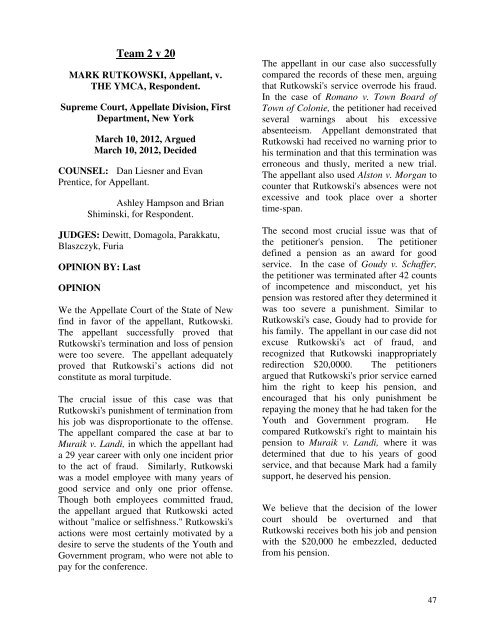2012 Conference Executive Record Report.pdf - YMCA of Greater ...
2012 Conference Executive Record Report.pdf - YMCA of Greater ...
2012 Conference Executive Record Report.pdf - YMCA of Greater ...
Create successful ePaper yourself
Turn your PDF publications into a flip-book with our unique Google optimized e-Paper software.
Team 2 v 20<br />
MARK RUTKOWSKI, Appellant, v.<br />
THE <strong>YMCA</strong>, Respondent.<br />
Supreme Court, Appellate Division, First<br />
Department, New York<br />
March 10, <strong>2012</strong>, Argued<br />
March 10, <strong>2012</strong>, Decided<br />
COUNSEL: Dan Liesner and Evan<br />
Prentice, for Appellant.<br />
Ashley Hampson and Brian<br />
Shiminski, for Respondent.<br />
JUDGES: Dewitt, Domagola, Parakkatu,<br />
Blaszczyk, Furia<br />
OPINION BY: Last<br />
OPINION<br />
We the Appellate Court <strong>of</strong> the State <strong>of</strong> New<br />
find in favor <strong>of</strong> the appellant, Rutkowski.<br />
The appellant successfully proved that<br />
Rutkowski's termination and loss <strong>of</strong> pension<br />
were too severe. The appellant adequately<br />
proved that Rutkowski’s actions did not<br />
constitute as moral turpitude.<br />
The crucial issue <strong>of</strong> this case was that<br />
Rutkowski's punishment <strong>of</strong> termination from<br />
his job was disproportionate to the <strong>of</strong>fense.<br />
The appellant compared the case at bar to<br />
Muraik v. Landi, in which the appellant had<br />
a 29 year career with only one incident prior<br />
to the act <strong>of</strong> fraud. Similarly, Rutkowski<br />
was a model employee with many years <strong>of</strong><br />
good service and only one prior <strong>of</strong>fense.<br />
Though both employees committed fraud,<br />
the appellant argued that Rutkowski acted<br />
without "malice or selfishness." Rutkowski's<br />
actions were most certainly motivated by a<br />
desire to serve the students <strong>of</strong> the Youth and<br />
Government program, who were not able to<br />
pay for the conference.<br />
The appellant in our case also successfully<br />
compared the records <strong>of</strong> these men, arguing<br />
that Rutkowski's service overrode his fraud.<br />
In the case <strong>of</strong> Romano v. Town Board <strong>of</strong><br />
Town <strong>of</strong> Colonie, the petitioner had received<br />
several warnings about his excessive<br />
absenteeism. Appellant demonstrated that<br />
Rutkowski had received no warning prior to<br />
his termination and that this termination was<br />
erroneous and thusly, merited a new trial.<br />
The appellant also used Alston v. Morgan to<br />
counter that Rutkowski's absences were not<br />
excessive and took place over a shorter<br />
time-span.<br />
The second most crucial issue was that <strong>of</strong><br />
the petitioner's pension. The petitioner<br />
defined a pension as an award for good<br />
service. In the case <strong>of</strong> Goudy v. Schaffer,<br />
the petitioner was terminated after 42 counts<br />
<strong>of</strong> incompetence and misconduct, yet his<br />
pension was restored after they determined it<br />
was too severe a punishment. Similar to<br />
Rutkowski's case, Goudy had to provide for<br />
his family. The appellant in our case did not<br />
excuse Rutkowski's act <strong>of</strong> fraud, and<br />
recognized that Rutkowski inappropriately<br />
redirection $20,0000. The petitioners<br />
argued that Rutkowski's prior service earned<br />
him the right to keep his pension, and<br />
encouraged that his only punishment be<br />
repaying the money that he had taken for the<br />
Youth and Government program. He<br />
compared Rutkowski's right to maintain his<br />
pension to Muraik v. Landi, where it was<br />
determined that due to his years <strong>of</strong> good<br />
service, and that because Mark had a family<br />
support, he deserved his pension.<br />
We believe that the decision <strong>of</strong> the lower<br />
court should be overturned and that<br />
Rutkowski receives both his job and pension<br />
with the $20,000 he embezzled, deducted<br />
from his pension.<br />
47
















